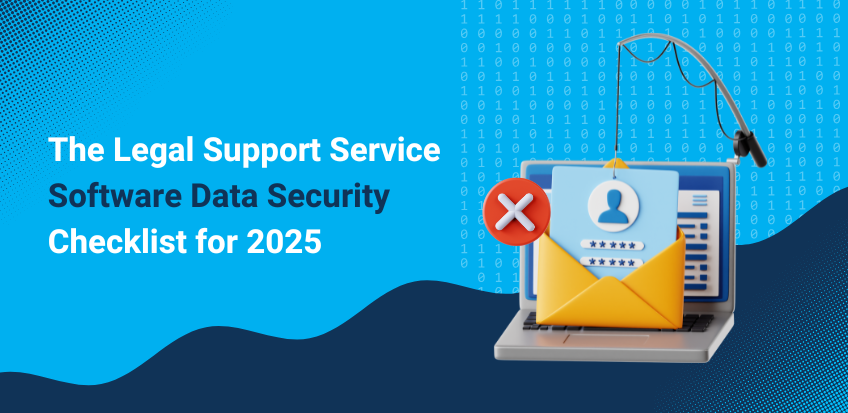Your law firm clients are a prime target for hackers because their court documents can be a treasure trove of confidential information like intellectual property, clients’ medical records, and financial information from them and their clients. Since a 2024 ABA survey revealed that 85% of litigators electronically file their court documents, implementing a strong legal support service data security strategy is critical to protect your business and its clients’ digital case files. Does your business leverage secure legal support software? If so, use this checklist to assess the effectiveness of its data security protocols.
1. Control Access to Your System
Why it’s important: If anyone can access your system without restrictions, client documents could fall into the wrong hands.
What to do:
☐ Require employees to use strong passwords that include letters, numbers, and symbols.
☐ Enable multi-factor authentication (MFA) for an extra layer of security.
☐ Assign user roles so only authorized employees can access sensitive data.
☐ Regularly review who has access and remove accounts that are no longer needed
Key term: multi-factor authentication (MFA)
Definition: A security process where you need to provide two or more types of information, like a password and a code that’s sent to your phone, to prove your identity before accessing an account.
2. Protect Documents and Confidential Data
Why it’s important: Court filings and legal documents often contain sensitive financial and business information that must remain confidential.
What to do:
☐ Use encryption to keep documents secure during transfer and storage.
☐ Implement access controls so only the right people can view or download files.
☐ Make sure your legal support service software provides an option to mark documents as “confidential.”
Key term: encryption
Definition: A security method that transforms readable text into an unreadable format to protect it from unauthorized access or interception.
3. Regularly Test Your Software’s Security
Why it’s important: Hackers are constantly finding new ways to break into systems.
What to do:
☐ Run security checks to identify weak points in your legal support service software.
☐ Work with IT professionals to perform security audits.
☐ Fix any vulnerabilities as soon as they are found.
Key term: vulnerability
Definition: A flaw or weakness in software that can be exploited by attackers to gain unauthorized account access and steal data.
4. Stay Compliant with Industry Standards
Why it’s important: Law firms expect their vendors to follow strict security standards.
What to do:
☐ Use legal support service software that meets stringent security regulations like System and Organization Controls (SOC) 2.
☐ Work with a vendor that continuously updates its platform’s security protocols.
☐ Keep up with changes in data security features that may impact how your business uses its software.
Key term: System and Organization Controls (SOC) 2
Definition: A set of security guidelines developed by the American Institute of Certified Public Accountants that companies continuously comply with to ensure they securely manage customer data.
5. Monitor Activity to Detect Suspicious Behavior
Why it’s important: Unauthorized access to your system could mean someone is trying to steal sensitive data.
What to do:
☐ Use legal support service software that tracks logins and user activity.
☐ Enable automatic session timeouts so inactive accounts don’t stay logged in.
☐ Regularly review reports to spot any unusual behavior.
Key term: automatic session timeout
Definition: A security measure that automatically logs out users after a period of inactivity to prevent unauthorized access to sensitive information.
6. Upgrade to a More Secure Software
Why it’s important: Some legal support service businesses use legacy systems that may not have modern security features.
What to do:
☐ Install security updates regularly.
☐ Add multi-factor authentication to older software.
☐ Upgrade to a more secure legal support service software like LegalConnect.
Key term: legacy system
Definition: Outdated software that an organization uses, even though it poses higher risks to cyberattacks due to lack of updates and advanced security features.
Want to learn more about LegalConnect’s data security features?
LegalConnect has built-in data security features that help protect your account and clients’ information. From secured content access and idle session timeouts to ongoing SOC 2 compliance, our legal support service software is designed with end-to-end data protection. Request a security demo to learn how LegalConnect can help your business strengthen its security posture, minimize the risk of a breach, and build greater trust with your law firm clients.
